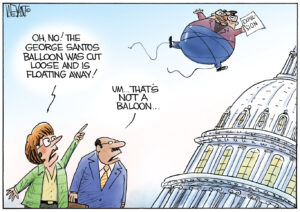The Gay Divorce Fandango
I suppose there is something charming about watching conservative politicians in Texas trying so ardently to preserve a same-sex marriage.I suppose there is something charming about watching conservative politicians in Texas trying so ardently to preserve a same-sex marriage.
How else can you explain their passionate opposition to a court ruling last week that would allow a couple legally wed in Massachusetts to be divorced in their state?
This tale of same-sex love and marriage, horse and carriage, and the difficulty of unhitching began in 2006 when two men known as JB and HB were wed with the usual set of hopes and dreams. A year later, one of them was transferred and they moved to Texas. There, the marriage went on the rocks.
Last January, the couple made an amicable agreement to divide their property. But when they went to court to formalize it, Republican Attorney General Greg Abbott leapt in. Since same-sex marriage was banned by a constitutional amendment, he argued, the state couldn’t dissolve a marriage it didn’t recognize.
Judge Tena Callahan saw things differently. Texas, she ruled, could grant divorces to couples legally married in other jurisdictions. Indeed, on this “limited issue” of divorce, she said, the state’s four-year-old gay marriage ban violated the federal right to equal protection.
At that point, Abbott swore to appeal the case in order to “defend the traditional definition of marriage.” The governor, Rick Perry, and Sen. Kay Bailey Hutchison, who’s running against him, were equally full-throated in their attempt to keep JB and HB together till death do them part.
As Evan Wolfson of Freedom to Marry says, “[T]he irony is that the anti-gay forces are so opposed to gay relationships they won’t even let us out of them.”
Let us stipulate that JB and HB did not set out to challenge the ban. Nor did they want to become the poster couple for same-sex divorce. But divorce happens. Same-sex marriages are as likely to end as straight marriages are. One of the less heralded set of legal protections offered by marriage is, well, divorce. And one of the strange side effects of the patchwork of gay-straight laws governing marriage is the impact on ending marriage.
Same-sex marriage is now legal in Vermont, Connecticut, Iowa and Massachusetts. In January, New Hampshire will join the roster. The District of Columbia may well be next if legislation introduced this week passes. And the issue is on the ballot this November in Maine. Meanwhile, 29 states ban it.
Men and women also get married according to state laws, but they are not suddenly single when they cross state borders. Under the principle of comity, their marriage can be recognized — or dissolved — anywhere. This is not necessarily true for gay couples. Indiana and Rhode Island have both denied divorce to gay couples who were married elsewhere, while New Jersey has allowed it. That’s just the beginning.
The refusal of one state to recognize the legal marriage of another state leads to some pretty impractical, unfair and nutty conclusions. The two Bs, for example, would have to move back to Massachusetts for a year just to get divorced.
That’s nothing compared to the scenarios imagined by Northwestern law professor Andrew Koppelman, author of “Same Sex, Different States.” On his list? If a man has a husband in Iowa, he might take a wife in Texas without being charged with bigamy. If a married couple from Connecticut has an accident in the Lone Star State, a woman could be barred from her wife’s hospital bedside because she isn’t family. Indeed, Koppelman adds, Texas could become a safe haven for the gay deadbeat dad who empties the joint account in Vermont and runs out on his husband and kids.
What we’re seeing are all sorts of potholes on the uneven road to equality. Remember the so-called compromise on gays in the military: “Don’t ask, don’t tell”? Now, military researchers call it a “costly failure.” It’s the law, not gay soldiers, that’s undermining morale.
Remember DOMA, the Defense of Marriage Act, which created a strange dual citizenship for gay couples — entitled to marriage benefits under some state laws, denied them under federal law? Now, Bob Barr, the former congressman who wrote DOMA, disavows it, and Bill Clinton, the president who signed it, publicly favors gay marriage. There’s a bill to repeal it.
But for sheer perversity, nothing quite beats the current Texas divorce fandango. There, the very people who insist they would like nothing more than to end gay marriage are the ones doing their utmost to keep one gay couple joined in unhappy perpetuity. For better or for worse? That’s an easy call.
Ellen Goodman’s e-mail address is ellengoodman1(at)me.com.
© 2009, Washington Post Writers Group
Your support matters…Independent journalism is under threat and overshadowed by heavily funded mainstream media.
You can help level the playing field. Become a member.
Your tax-deductible contribution keeps us digging beneath the headlines to give you thought-provoking, investigative reporting and analysis that unearths what's really happening- without compromise.
Give today to support our courageous, independent journalists.






You need to be a supporter to comment.
There are currently no responses to this article.
Be the first to respond.